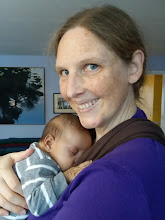Giving thanks
Winter is here at last, with icy north winds that sweep the last of the oak leaves down the gutters. The sun sets around four. I walked downtown last week for groceries, and the wind had numbed my face through the scarf before I was halfway there. I’d forgotten what cold feels like, the way cold takes up residence in your ribcage. Walking through the small patch of woods behind Eastern near twilight yesterday, I felt absurdly naked without a pack on. I caught myself scanning the forest for clearings near the trail, and realized I was looking for a tentsite. This weather and the low light in the oak trees brings it all back: sleeping in the cold and waking in the cold; making sure your boots freeze in a shape that you will be able to work your frozen feet into in the morning.
Sometimes I miss the Trail with a desperate intensity. A hiker friend who I’ve recently gotten back in touch with said, “I think about the A.T. like an ex-girlfriend.” And it is kind of like that—so easy to look bad and remember just the good parts, and think, why did it ever end? and then you remember the bad parts, and think, why did I ever do that to myself? Walking under the cold oaks at dusk I thought about the simplicity of Trail life, which is the aspect I miss the most. The day’s task was as easy as putting one foot in front of another, finding water, cooking food, surviving. You only have to look for the next white blaze to know where to go. Especially in winter, when these simple tasks consumed all the energy I had and more, the Trail life had a Zen-like focus in the moment. Life in the outside, the “real world,” is so much more scattered and various. There are no blazes to guide anything. The goals are bigger, though, than simply reaching a mountaintop somewhere in the forest.
On Thursday, if all goes well, I will finish my doctorate. It’s a bittersweet feeling to know that I will soon be leaving Connecticut. This has been a good place for me, mostly; I’ve learned so much about love, friendship, ecology, survival. I will miss a lot of people here. Not the place, necessarily—Connecticut is far enough north that it snows, but far enough south that people don’t know how to drive in the snow, among other shortcomings. But the people here... more than anything, I’m going to miss Robin and her family. She’s been the most wonderful advisor anyone could hope for. She and Rob have welcomed me into their home like another daughter. I’ve watched her kids grow up into amazing young adults. I’ve learned so much from her guidance, and it’s been such a joy getting to know her. I spent Thanksgiving with Robin’s family and friends, a gala feast that concluded with Pictionary and Scrabble into the wee hours of the morning. I hope that someday I will have a home and a family of my own so full of love, curiosity, and good humor.
As the cold and darkness settle in, this is a good time to take stock and give thanks. I am thankful that I will not be living in a tent this winter. I am thankful for the wonderful people I have known. I am thankful to have been here and thankful to be leaving.

